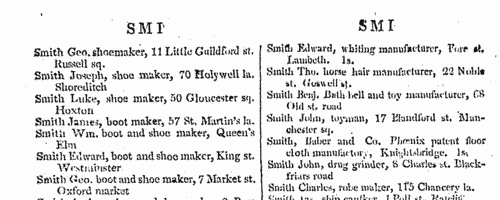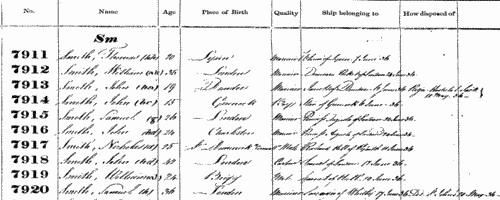Roads Surname Ancestry ResultsOur indexes 1000-1999 include entries for the spelling 'roads'. In the period you have requested, we have the following 109 records (displaying 71 to 80): Single Surname Subscription | | | Buying all 109 results of this search individually would cost £654.00. But you can have free access to all 109 records for a year, to view, to save and print, for £100. Save £554.00. More... |
These sample scans are from the original record. You will get scans of the full pages or articles where the surname you searched for has been found. Your web browser may prevent the sample windows from opening; in this case please change your browser settings to allow pop-up windows from this site. Traders and professionals in London
(1805)
Holden's Triennial Directory for 1805 to 1807 includes this 'London Alphabet of Businesses, Professions, &c.': coverage is good; about 30,000 individuals are recorded.ROADS. Cost: £4.00.  | Sample scan, click to enlarge

| Workers at Pooley's Cotton Mill, Manchester
(1818)
The minutes of evidence taken before the Lords Committee on the Cotton Factories Bill include a series of reports by medical men as to the general health of the mill workers in April 1818. For each factory there is a complete list of workers, giving full name, age, how long employed in a factory, health (in general terms, such as 'Good' or 'Sickly'), and any chronic disease or 'distortion', cause and duration - with slight variations from report to report. The physicians examined several hundred people each day, asking such questions as 'Have you any swellings or sores anywhere?', 'Are your limbs straight?', 'Have you a good appetite for food?', 'Do you conceive yourself to be in good health?', and all concluded that the health of the mill workers was good, and that the workers were cheerful. This is the report for Messrs John Pooley junior & Co.'s cotton spinning factory in Hulme, 21 April 1818.ROADS. Cost: £6.00.  | Sample scan, click to enlarge

| Buckinghamshire Freeholders: Grendon Underwood
(1831)
The poll of the freeholders of Buckinghamshire at the election of two knights of the shire to serve in Parliament, taken at Aylesbury 5, 6, 7 and 9 May 1831. The candidates were the Marquis of Chandos, John Smith esquire, and Pascoe Grenfell esquire. This poll book sets out the names of the voters in alphabetical order hundred by hundred and parish by parish. The freeholders' full names are stated, surname first, and the place of their abode (often elsewhere). The right hand column records their votes. The qualification for suffrage in the counties was the possession of a freehold estate worth more than 40s a year.ROADS. Cost: £6.00.  | Sample scan, click to enlarge

| Buckinghamshire Freeholders: Marsh Gibbon
(1831)
The poll of the freeholders of Buckinghamshire at the election of two knights of the shire to serve in Parliament, taken at Aylesbury 5, 6, 7 and 9 May 1831. The candidates were the Marquis of Chandos, John Smith esquire, and Pascoe Grenfell esquire. This poll book sets out the names of the voters in alphabetical order hundred by hundred and parish by parish. The freeholders' full names are stated, surname first, and the place of their abode (often elsewhere). The right hand column records their votes. The qualification for suffrage in the counties was the possession of a freehold estate worth more than 40s a year.ROADS. Cost: £6.00.  | Sample scan, click to enlarge

| Buckinghamshire Freeholders: Steeple Claydon
(1831)
The poll of the freeholders of Buckinghamshire at the election of two knights of the shire to serve in Parliament, taken at Aylesbury 5, 6, 7 and 9 May 1831. The candidates were the Marquis of Chandos, John Smith esquire, and Pascoe Grenfell esquire. This poll book sets out the names of the voters in alphabetical order hundred by hundred and parish by parish. The freeholders' full names are stated, surname first, and the place of their abode (often elsewhere). The right hand column records their votes. The qualification for suffrage in the counties was the possession of a freehold estate worth more than 40s a year.ROADS. Cost: £6.00.  | Sample scan, click to enlarge

| Buckinghamshire Freeholders: Twyford
(1831)
The poll of the freeholders of Buckinghamshire at the election of two knights of the shire to serve in Parliament, taken at Aylesbury 5, 6, 7 and 9 May 1831. The candidates were the Marquis of Chandos, John Smith esquire, and Pascoe Grenfell esquire. This poll book sets out the names of the voters in alphabetical order hundred by hundred and parish by parish. The freeholders' full names are stated, surname first, and the place of their abode (often elsewhere). The right hand column records their votes. The qualification for suffrage in the counties was the possession of a freehold estate worth more than 40s a year. The entry for Twyford includes Charndon and Poundon.ROADS. Cost: £6.00.  | Sample scan, click to enlarge

| Cambridgeshire Voters: Ely
(1832)
The poll on the election of three knights of the shire to serve in Parliament for the county of Cambridge, was taken at Cambridge, Royston, Newmarket, Ely, Wisbech and Whittlesea 18 and 19 December 1832. The candidates were Henry John Adeane esquire, Richard Greaves Townley esquire, Charles Philip Yorke esquire and John Walbanke Childers esquire. This poll book sets out the names of the voters in alphabetical order hundred by hundred and parish by parish. The voters' full names are stated, surname first. The right hand column records their votes. The new qualification for suffrage in the counties, after the passage of the 1832 Great Reform Bill, was the possession of a freehold estate worth 40s a year or more, a copyhold or long leasehold of £10 a year or more, or a tenancy or short leasehold of £50 a year or more.
ROADS. Cost: £6.00.  | Sample scan, click to enlarge

| Freemen of the City of Oxford
(1834)
A List of the Freemen and Householders of the City of Oxford, Registered July 31st, 1834, as Entitled to Vote in the Election of Members for the said City. This starts with an alphabetical list of the freemen of the city, which gives (as in the sample scan) full name, address and occupation. Then follow lists of householders, by parish or ward, but without giving occupations.ROADS. Cost: £4.00.  | Sample scan, click to enlarge

|  British merchant seamen
(1835-1836) British merchant seamen
(1835-1836)
At this period, the foreign trade of ships plying to and from the British isles involved about 150,000 men on 15,000 ships; and the coasting trade about a quarter as many more. A large proportion of the seamen on these ships were British subjects, and so liable to be pressed for service in the Royal Navy; but there was no general register by which to identify them, so in 1835 parliament passed a Merchant Seamen's Registration Bill. Under this act this large register of British seamen was compiled, based on ships' crew lists gathered in British and Irish ports, and passed up to the registry in London. Each seaman was assigned a number, and the names were arranged in the register by first two letters of the surname (our sample scan shows one of the pages for 'Sm'); in addition, an attempt was made to separate out namesakes by giving the first instance of a name (a), the second (b), and so on. But no effective method was devised to prevent the same man being registered twice as he appeared in a second crew list; moreover, the original crew lists were clearly difficult for the registry clerks to copy, and some of the surname spellings appear to be corrupted. A parliamentary committee decided that the system devised did not answer the original problem, and this register was abandoned after less than two years: but it is an apparently comprehensive source for British merchant seamen in 1835 to 1836. The register records the number assigned to each man; his name; age; birthplace; quality (master, captain, mate, 2nd mate, mariner, seaman, fisherman, cook, carpenter, boy &c.); and the name and home port of his ship, with the date of the crew list (usually at the end of a voyage). Most of the men recorded were born in the British Isles, but not all (for instance, Charleston and Stockholm appear in the sample scan). The final column 'How disposed of' is rarely used, and indicates those instances where a man died, was discharged, or deserted his ship during the voyage.ROADS. Cost: £8.00.  | Sample scan, click to enlarge

|  London Policemen
(1830-1842) London Policemen
(1830-1842)
The Metropolitan Police Register of Joiners (MEPO 333/4) lists policemen joining the force through to 31 December 1842 (to warrant number 19892). The register is alphabetical, in so far as the recruits are listed chronologically grouped under first letter of surname. It is evidently a continuation of a similar earlier register, not closed until its alphabetical sections were filled: consequently, there are no entries in this register for the initial letters N, O, Q, U, V, X, Y or Z; and the sections of this register start at different dates - A 18 April 1840 (warrant number 16894); B 11 December 1830 (5570); C 7 September 1830 (4988); D 27 May 1833 (8445); E 15 December 1838 (14476); F 30 March 1832 (7372); G 1 December 1835 (11,184); H 25 April 1832 (7457); I and J 13 February 1837 (12449); K 2 January 1838 (13457); L 3 October 1834 (9905); M 15 November 1832 (7999); P 4 October 1831 (6869); R 4 September 1837 (13021); S 30 March 1835 (10366); T 6 April 1840 (16829); W 30 December 1833 (9096). The register gives Date of Appointment, Name, Number of Warrant, Cause of Removal from Force (resigned, dismissed, promoted or died), and Date of Removal. Although the register was closed for new entrants at the end of 1842, the details of removals were always recorded, some being twenty or more years later. Those recruits not formerly in the police, the army, or some government department, were required to provide (normally) at least two letters of recommendation from persons of standing, and details of these are entered on the facing pages: the names in these are indexed separately - this index refers only to the police constables. Where a recruit was only recently arrived in the metropolis, the names and addresses of the recommenders can be invaluable for tracing where he came from.ROADS. Cost: £8.00.  | Sample scan, click to enlarge

|
Research your ancestry, family history, genealogy and one-name study by direct access to original records and archives indexed by surname.
|













